How Do World of Warcraft-Players Experience and Give Meaning to Their Activity? An Interpretive Phenomenological Analysis
Master thesis

View/
Date
2011-04-15Metadata
Show full item recordCollections
- Faculty of Psychology [527]
Abstract
With its 12 million players World of Warcraft (WoW) is one of the most popular computer games to date. The game s versatility makes it a unique phenomenon for scientific and even philosophic exploration. However, the public's attention has mainly been directed to stories of players who are portrayed as victims to the games seductiveness. Consequently the game has become a central topic in the controversial issue of video game addiction. This apparent unilateral focus on the game's potential addictiveness has led some of its players to experience being subject to stigmatization. In this study we explore how players experience and gave meaning to their playing. An IPA analysis of a focus group interview with three highly experienced players was conducted. The findings revealed three reciprocally connected main themes; identity, social interaction and game play. The participants themselves appeared to consider the social aspect to be the most important factor. Negative attention by non-players brought shame and concealment to a highly appreciated recreational activity. In-game friendships and relations were reoccurring topics, and were mainly perceived as meaningful and rewarding. The community constituted a complex digital culture with its own rules and norms, making it an arena for identity and play. Med sine 12 millioner spillere er World of Warcraft (WoW) i dag det mest populære dataspillet innen sin sjanger. Spillets allsidighet gjør det til et unikt fenomen for vitenskapelig og filosofisk utforskning. Imidlertid har offentlighetens oppmerksomhet i hovedsak vært rettet mot enkelthistorier om spillere som blir framstilt som ofre for spillets forførende egenskaper. Dette har medført at spillet har blitt et sentralt tema i den kontroversielle debatten om videospillavhengighet. Det ensidige fokuset på spillets avhengighetsaspekt har medført at noen av dets spillere opplever at de blir utsatt for stigmatisering. I denne studien ønsker vi å utforske hvordan WoW-spillere selv opplever og gir mening til spillingen. En IPA analyse av et fokusgruppeintervju med tre svært erfarne spillere ble gjennomført. Deltakernes erfaringer avdekket tre resiprokale og sammenkoblede hovedtemaer: identitet, sosial interaksjon og lek. Deltakerne selv anså det sosiale aspektet som den viktigste faktoren. Negativ oppmerksomhet fra ikke-spillere brakte skam og fortielse til en ellers høyt verdsatt fritidsaktivitet. Spillrelaterte vennskap og relasjoner var et gjennomgående tema, som hovedsaklig ble oppfattet som meningsfulle og givende. WoW-samfunnet utgjorde en kompleks digital kultur med sine egne regler og normer, og syntes å utgjøre en arena for både identitet og lek.